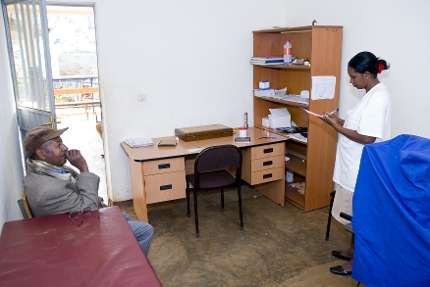Bearing the costs of illness

Although there is evidence that households are able to foresee health expenses to some degree, there is little or no evidence that these expectations have an effect on the actual take up of health insurance. When people have health insurance, they tend to reduce health-risk prevention efforts, such as using mosquito nets. This was found to be the case in the Ghanaian National Health Insurance. Zelalem Yilma Debebe defended his PhD on the economic costs of illness, and effectiveness and problems of health insurance schemes in Ethiopia and Ghana on 4 December 2015 at the International Institute of Social Studies (ISS) of Erasmus University Rotterdam.
How are people dealing with health shocks compared to other kind of costly shocks? Where do they pay their bills from? Debebe's main finding is that people rely heavily on borrowing to finance health costs compared to other shocks. Other kind of responses are reductions in savings and selling assets. Reductions in food consumption, a quite regular response in the case of natural and economic shocks, are absent for health shocks though. Another notable characteristic is that informal safety nets and reliance on friends and family for support, at least in the form of gifts, is virtually non-existent.
Economic risks
Debebe also found evidence that being ill means walking a substantial economic risk because of increased health expenditure and reduced agricultural productivity. Households cope with these risks by letting other family members work more, hiring wage labor, borrowing and depleting assets. While households do not decrease their food consumption, non-food consumption declines. This effect is larger for households with the lowest ability to self-insure. Debebe argues that the relative insensitivity of food consumption should not be viewed as insurability of food consumption against health shocks, but rather as an indication that a reduction in food consumption is not a viable coping response to a health shock. It simply does not provide enough cash to meet health care needs.
Households base expectations regarding future medical expenses on their past spending levels. However, there is high volatility in health expenditure. This suggests that the financial viability of the CBHI scheme is unlikely to be affected by the mechanism that people who join the scheme expect higher chance of falling ill. Although there is evidence that households are able to foresee health expenses to some degree, there is little or no evidence that these expectations have an effect on the actual take up of health insurance.

However, lessening health-risk prevention efforts after insurance enrolment – also called ex-ante moral hazard – is found to be a challenge in the National Health Insurance (NHI) scheme of Ghana. For example, Debebe found that people participating in the scheme reduced the use of insecticide-treated bed nets, which is the most important malaria prevention strategy in malaria endemic areas.
Health policy and systems research
Zelalem Yilma Debebe defended his PhD on the economic costs of illness, and effectiveness and problems of health insurance schemes in Ethiopia and Ghanaon 4 December 2015 at the International Institute of Social Studies (ISS) of Erasmus University Rotterdam. The research took place within the 'Community based health insurance in Ethiopia' project of Professor Bedi (EUR-ISS). This project focuses on health financing within the 'Global Health Policy and Health Systems' research programme.Health systems in many low- and middle income countries are weak, inadequate or even non-existent. The Global Health Policy and Health Systems research programme (GHPHSR) supports research into how such health systems can be improved so as to increase the likelihood of the Millennium Development Goals being achieved.


















